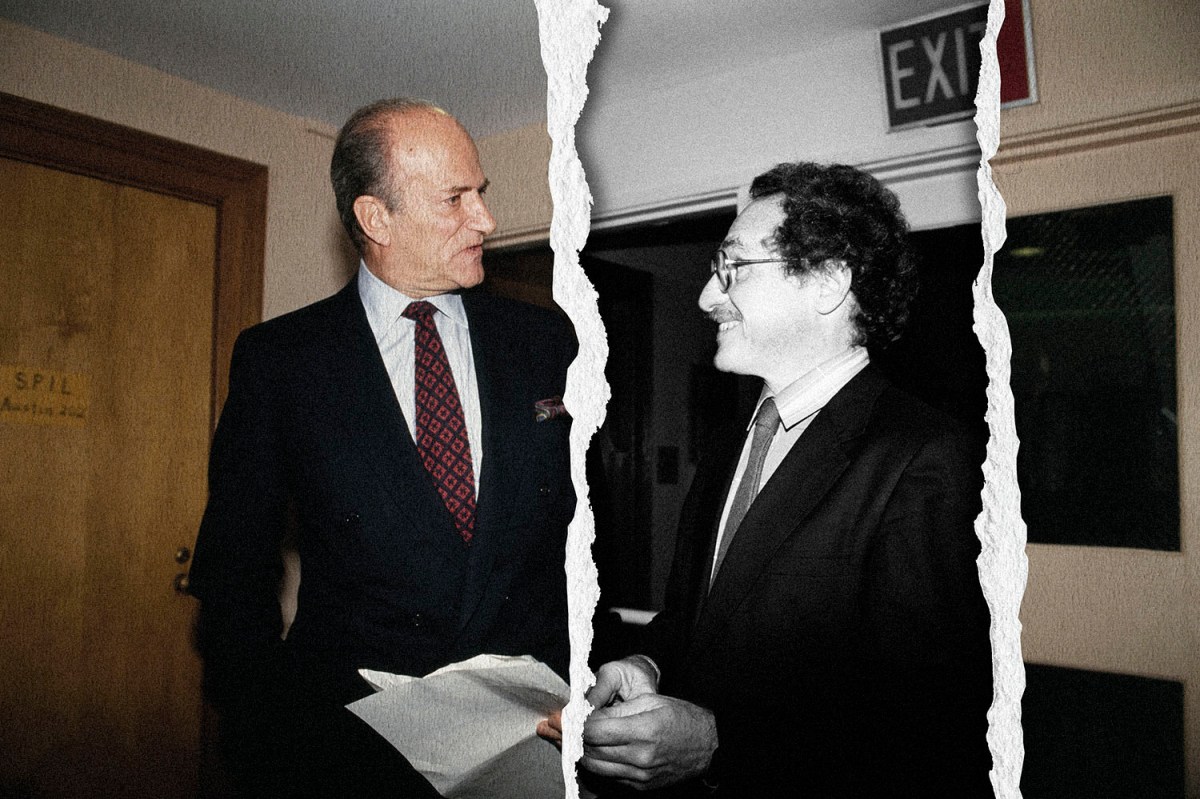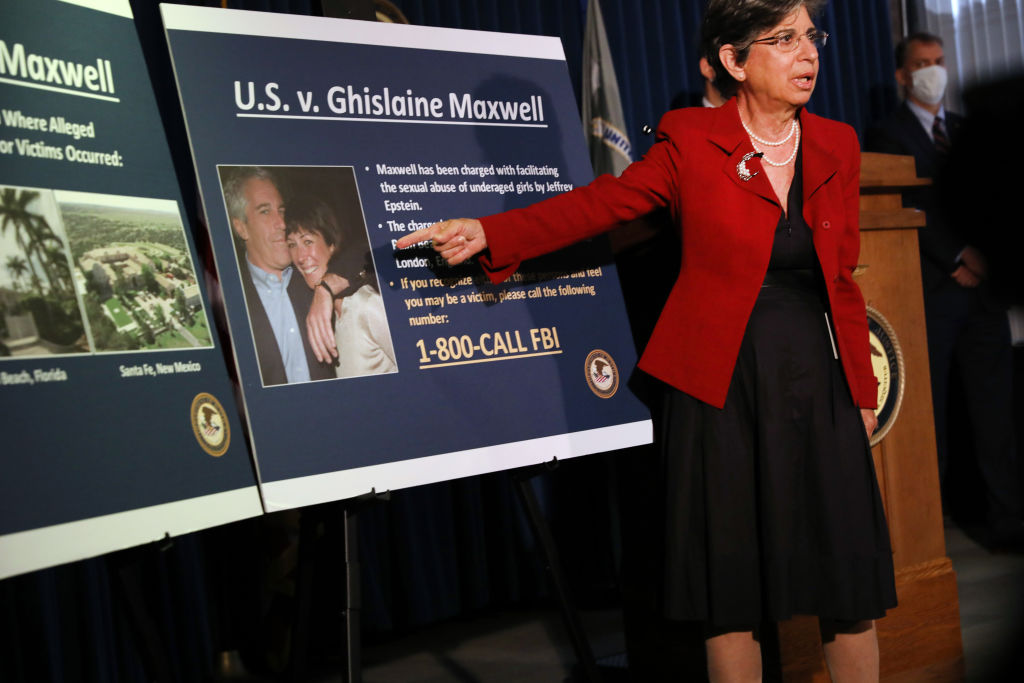Much in the same way that a young person today might know, say, J.K. Rowling as a controversy-courting public figure first and a children’s author second, Alan Dershowitz’s stature as lawyer has been gradually overshadowed by his second career as a soundbite machine. He’s become a reliable source of indelible quotes in recent years, his eyebrow-raising statements outside the courtroom every bit as defining to his person as the high-profile cases he’s taken. Earlier this month, he tweeted in response to a Page Six item that claimed that the 81-year-old has been absent from his favored Martha’s Vineyard nude beach out of a desire to keep a low profile as the Jeffrey Epstein pedophilia scandal continues to unfurl.
“I hope Epstein made videos,” Dershowitz wrote. “There have been suggestions that Epstein made secret videos of all the men who had sex in his houses and planes. I hope he did and they are all revealed, because they will prove I am not among them. I hereby waive any right of privacy in Epstein videos.” (His previous tweet consists of a stream of gibberish that we may safely presume was supposed to be a link to the Kindle edition of his book about the failings of the #MeToo movement.)
Though designed to promote an image of transparency, this missive raises just as many questions as it quells, chief among them the extent of his involvement in the alleged pedophilic ghastliness that transpired on Epstein’s properties. The Dersh has confessed to receiving a massage at Epstein’s mansion, but maintains that the masseuse was an adult woman and, harrowingly, that “I kept my underwear on during the massage. I don’t like massages, particularly.” This clashes with Dershowitz’s chilling advice doled out in the film No Safe Spaces — “If you want to feel good, get a massage” — but that’s neither here nor there. His point is that however things may look, we do not know for sure what did or did not happen, a notion driven home by Dershowitz’s on-the-record characterization of a woman accusing him and Epstein of sexually exploiting her as a teenager. “She’s an admitted prostitute and a serial liar,” he said during an interview with WPLG last year.
Dershowitz thrives on that not-knowing, using the legal wiggle room it creates to chart escape routes for such infamous clients as O.J. Simpson, Harvey Weinstein, Donald Trump and now, himself. This has been his modus operandi since the ‘80s, when he took on the first of the most-hated-man-in-America cases that he would make his stock-in-trade. But the place to revisit El Dersho’s origin story and the often damning insights into his psyche that it reveals may well be the 1990 film Reversal of Fortune, released in theaters 30 years ago, just five after the fact of Claus Von Bülow’s widely publicized retrial.
A brief primer on the sordid tale of Sunny and Claus von Bülow, for those unschooled on the tabloid classics: he was the son of a Nazi collaborator who made his nut as the protege to oil baron J. Paul Getty; she was the socialite heiress with a fortune that far exceeded his. They married, things grew reputedly icy, and one evening in December 1980, she slipped into a diabetic coma from which she would never awaken. Sunny’s relatives fingered Claus, and though a 1982 trial found him guilty, he immediately sought an appeal. Though he was reviled far and wide as a rich creep who did away with the wife he’d grown weary of, he insisted on his own innocence.
That’s where Reversal of Fortune begins, with Alan Dershowitz’s introduction into the story. (The script adapts his 1985 book, which rehashes his time working on the headline-grabbing trial. By the project’s very nature, we’re getting everything through Dersh-colored glasses.) He had already established himself as a formidable law stylist by that point, having made his bones on a 1976 free-speech case defending pornographer Harry Reems. Dershowitz stirred up the sort of media spectacle that now dots his résumé, learning how the influence of TV and news could be used to exercise sway over an outcome. In their coverage of the Reems trial, the New York Times described the young Harvard law professor as “the country’s most impressive legal talent.” It was this reputation that drew a desperate von Bülow to contact Dershowitz for defense in his hopeful retrial.
Barbet Schroeder’s award-winning film offers us a more intimate, human perspective on Dershowitz. (Jeremy Irons scooped up the Oscar for Best Actor as the archly off-putting Claus, presaging the following year’s win for another captivating villain who’s really a supporting character — Hannibal Lecter.) With rolled-up denim shirt sleeves and an Isro mop of curly hair, Ron Silver portrays Dershowitz, a skeptical, intrepid everyman. We first see him taking the call from von Bülow while sharing a tender moment with his son, a scene that ends with a hair tousle right out of a Jewish version of Leave It to Beaver. He likes to unwind with his team by playing some casual B-ball. He’s a guy’s guy. He’s the Dersh.
The film consistently conflates his Judaism with middle-class bona fides, like the scene in which he takes everyone out to a dingy Chinese restaurant for dinner, a marked contrast with the haute cuisine to which von Bülow treats Dershowitz at their first meeting. Before that lunch, the self-styled Euro-aristocrat makes an awkward overture: “I have the utmost respect for the intelligence and integrity of the Jewish people.” An unwitting viewer in 1990 would have had only the faintest inkling that Dershowitz was by that point a handsomely wealthy man at the head of a sizable practice, and no idea that he’d eventually come to have more in socioeconomic common with von Bülow than any of his colleagues.
But Schroeder and screenwriter Nicholas Kazan mostly define Dershowitz by his principles. In the film’s most pivotal scene, he addresses the elephant in the room by explaining his reasoning for taking von Bülow’s case to a room full of his students. One young woman (a pre-fame Felicity Huffman, lending this whole thing a tinge of irony) says that the case and the defendant “stink,” an assertion against which Dershowitz argues with the studied ferocity of a trial lawyer:
He adopts the classic “I disapprove of what you say, but I will defend to the death your right to say it” pose of the objective moralist. He doesn’t claim to know Claus is innocent, and what he says suggests that he considers that much to be none of his business. He first offers the oily rationalization that “If lawyers only defended innocent clients, there would only be 10 defense lawyers in the country,” and when Huffman’s character presses onward, he lands on the sturdy-sounding platitude that “everyone gets a defense.” She points out that he’d had a defense already, and yet Dershowitz remains undeterred, dubious that the trial was fair. By that logic, anything could be subject to re-litigation, but all the same, we’re supposed to get some whiff of valiance from this moment.
Dershowitz suspects that the verdict has been sullied by the general “I did it” vibes that Claus put out during the first trial, that he’s a victim of the kangaroo court of public opinion. “The more dangerous conviction is the absolute certainty of the American people that Claus is guilty,” he announces to his team. This scene would seem to place him in a tradition with the heroes of great legal thrillers past, upstanding citizens like To Kill a Mockingbird’s Atticus Finch or Twelve Angry Men’s Juror No. 8. Like them, he stands up for a man widely presumed guilty, squinting at the evidence until all assumptions have been upended. However, the overall tenor of this scene draws a false equivalency, assigning the same heroic aura as a white man using his privilege to advocate for a person of color to one rich guy defending an even richer one. The casting of Uta Hagen also seems like a metatextual comment, likening her baseless blacklisting from Hollywood for supporting Communists to the “persecution” suffered by Bulow.
(Because movies tend to operate under a simplified moral calculus, we also learn that the Dersh only accepts von Bülow’s case and the hefty fee that comes with it so that he can finance his pro bono cases clearing the names of Black kids on death row. A pair of teenagers set “to fry” get mentioned often, though always in such vague terms. They’re never seen, though in the series of title cards closing out the film, we learn they’re still scheduled for execution while von Bülow walks free. What little presence they have is purely functional, one of the dead giveaways to the film’s deep cynicism.)
Things take a turn for the procedural as Dershowitz goes about assembling his case against Sunny von Bülow’s relatives, a defense reliant on craftiness and rule-bending. He openly states that their mission is to undermine the key evidence brought against Claus, an insulin needle alleged to have delivered the coma-inducing dose to Sunny. He first sets out to prove that the relatives collected their evidence in such a manner that should render it inadmissible, a gambit made possible by introducing new evidence to a settled case — an unorthodox, semilegal move that only works because Dershowitz tricks his opponent into engaging with it.
He tugs at the threads of the case against Claus until everything has been boiled down to the veracity of one physical item. In the same way that Dershowitz turned the question of O.J.’s innocence into whether he could fit a glove on his hand, he hangs Claus’ appeal on that needle. The point had been found to be encrusted with dried insulin, which indicates that it had been dipped in the substance after injection. In other words, tampered-with. Claus walks!
The final scene, in which Claus makes a cat-that-ate-the-canary face as he jokingly asks a pharmacy clerk for insulin, confronts us with the unsettling notion that he may have exploited Dershowitz’s ethical flexibility. By the lawyer’s own code, however, Claus’s goodness has been affirmed by the verdict. Because he’s gone through a trial uncolored by perception, the question has been settled. (This philosophy is rich coming from Dershowitz, who has long used witness-smearing as a go-to tactic, whether that’s painting Sunny to be an out-of-control drug addict or denouncing Weinstein’s accusers as attention-seekers out for a payday or career bump.)
Dershowitz’s entire weltanschauung as a lawyer hinges on the notion that we cannot cast judgment on anyone without access to all the hard evidence of their wrongdoing, which is to say that in most instances, with their he-saids and she-saids, we cannot cast judgment on anyone. It’s an echo of a sentiment voiced by none other than Louis C.K. in his unreleased film I Love You Daddy, in which he declares that no one really knows what goes on in the interior of anyone’s relationships, and so they should mind their own business. That’s the cornerstone of the Dershowitz doctrine: that no matter how clear things may seem, we do not know the private moments between Sunny and Claus, or Nicole and O.J., or between Trump and his advisors. If it can’t be proven, it doesn’t exist.

Dershowitz won the battle for Claus, but it would seem as if he’s increasingly losing the war. The proliferation of so-called ‘cancel culture’ should be the Dersh’s worst nightmare come to life: a system of judgment in which consequences are determined not by whichever side gets away with more expert legal maneuvering, but by the Occam’s razor logic of every American. There’s an easy counter to be made against this: the notion that courts exist in the first place because many cases are not what they seem and require close inspection by highly trained professionals. While that’s true, the public has taken matters into their own hands specifically because the courts have failed again and again. The legal system is very easily gamed, a fact of life Dershowitz knows all too well, and when outraged citizens see no other recourse, they will speak out and seek justice on their own terms.
In a 2018 op-ed for The Hill, Dershowitz referred to California’s recalling of Judge Aaron Persky (he who let rapist Brock Turner off with six months and a slap on the wrist) as “a self-inflicted wound to judicial independence.” It’s easy to see the Turner trial and its fallout as a repeat of the Claus case, and as such, an existential threat to Dershowitz’s entire way of practicing law. Reversal of Fortune clarifies that he helped create the climate against which he’s been raging, a culture that now has him in its crosshairs. Spending so many years getting men like Claus off while turning a willful blind to their presumptive guilt pushed the public to any available alternative. In the film, the tangle of unsureness about Claus makes for a beguiling thought experiment, and leaves a lionized version of Dershowitz to wrestle with it. In the real world, with the stakes that much higher, he’s been all too happy to equivocate.
This article was featured in the InsideHook newsletter. Sign up now.























